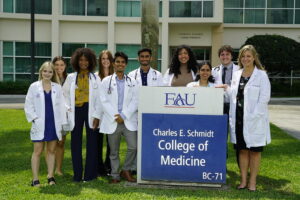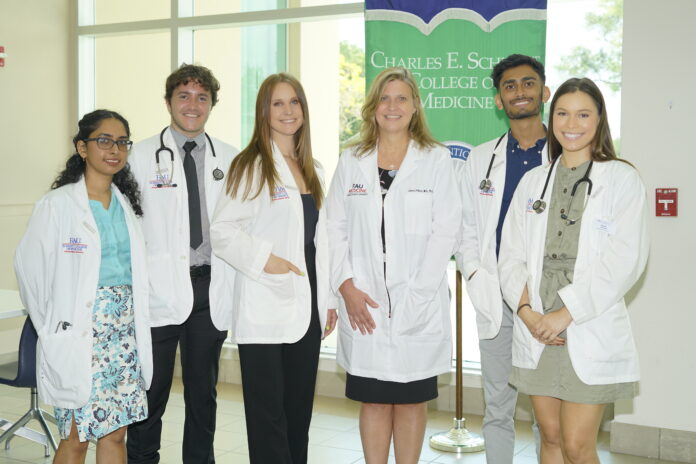Ten years ago, I set a career goal to become a dean for a college of medicine. To that end, I worked toward gaining experience in the clinical, education and research aspects of medicine under the guidance of Dean Vince Verdile at Albany Medical College. The next step was gaining the position of chair of The Department of Neuroscience and Experimental Therapeutics after a national search. Subsequently, I obtained additional leadership training through the Harvard course for chairs, Executive Leadership in Academic Medicine and my MBA. To help me garner institutional budget experience, I joined the system’s finance committee. To gain philanthropy experience, I obtained formal training and worked closely with our institutional foundation, specifically in securing gifts from our Parkinson’s Disease community and for our institutional faculty development program, which I co-directed. On February 14, 2022, I joined the students, staff and faculty in the Schmidt College of Medicine at Florida Atlantic University (FAU) as dean and vice president of Medical Affairs. Instantaneously, I felt the humbling responsibility of becoming the first female neurosurgeon to become a dean.
I have begun working with FAU’s president, John Kelly and chair of FAU’s Board of Trustees, Brad Levine, to build FAU Health Network, a coalition of collaboration among FAU’s nine colleges on six campuses, enabling us to play a pivotal role in a new phase of responsive and innovative healthcare delivery in South Florida. Our overarching goal is to improve the care of the 3.2 million patients in Palm Beach, Broward and Martin Counties, by transcending the competitive landscape through joint educational and research endeavors. We will work with our community partners to offer outstanding opportunities for dynamic faculty and learner experiences, provide connectivity to the local healthcare community and ensure recruitment and retention of our skilled health care professionals.
South Florida’s community has been significantly impacted by physician shortages due to rapidly increasing patient populations. Therefore, increasing our medical school class size and graduate medical education, while retaining these graduates, is paramount for building a sustainable health care workforce, representing the rich diversity of our community. Notably, last month, we received a pledge of $28 million from the Fairfax Wood Scholarship Foundation to support scholarships for our medical students. This is the largest scholarship gift in FAU’s history and represents the Woods’ aspirational goal of creating “doctors without debt.”

Physicians are but one part of developing a health care workforce. This directive has informed our key component to “increase pre-health pathways from FAU’s Bezos Academy for PK to A.D. Henderson (K-12) through employment” as health care professionals. Tied to FAU’s “Success for all” emphasis, the basis for revolutionizing health care is interprofessional education that starts in preschool and extends through post-graduate training.
I am thankful for my past experiences in basic science, clinical experiences and outreach initiatives that have helped me navigate complex relationships with a variety of stakeholders. Further, the value of participation in organized neurosurgery cannot be overstated. Through the experiences of serving as an officer of the American Association of Neurological Surgeons/Congress of Neurological Surgeons Joint Sections on Pain and Women in Neurosurgery and American Society of Stereotactic and Functional Neurosurgery (ASSFN), I received training on all the aspects that I now do on a daily basis. During my first 100 days, I often felt like a neurosurgical intern once again, frequently asking “What do we normally do?”
I was fortunate to have several current and past medical school deans who mentored me behind the scenes and even on-site, including Luanne Thorndyke, MD, and Laura Schweitzer, PhD, who initiated leadership development programs for FAU faculty and staff. I will forever value my mentors, A. John Popp, MD, FAANS(L), FACS, and Fernando Diaz, MD, PhD, FAANS; my sponsors, Aviva Abosch, MD, PhD, FAANS, Deb Benzil, MD, FAANS, FACS, and Karin Muraszko, MD, FAANS. Additionally, I am grateful for my on-the-ground support system from ASSFN, AANS/CNS Joint Section on Pain and North American Neuromodulation Society, Andre Machado, Joseph Neimat, MD, MSc, FAANS, David Provenzano and Joshua Rosenow, MD, FAANS, FACS, among many others. Mentees and colleagues were there every step of the way encouraging me to forge ahead to achieve my career goals. Truly, in talking to many inspiring people who have risen up the ranks, it is just having the people there to tell you to “persevere” that makes all the difference.
A community is essential for all of us to get to where we are going. The central tenet of my time at FAU will echo that spirit of developing a health care workforce “of the community, for the community.” I am proud to be a part of the neurosurgical community.








